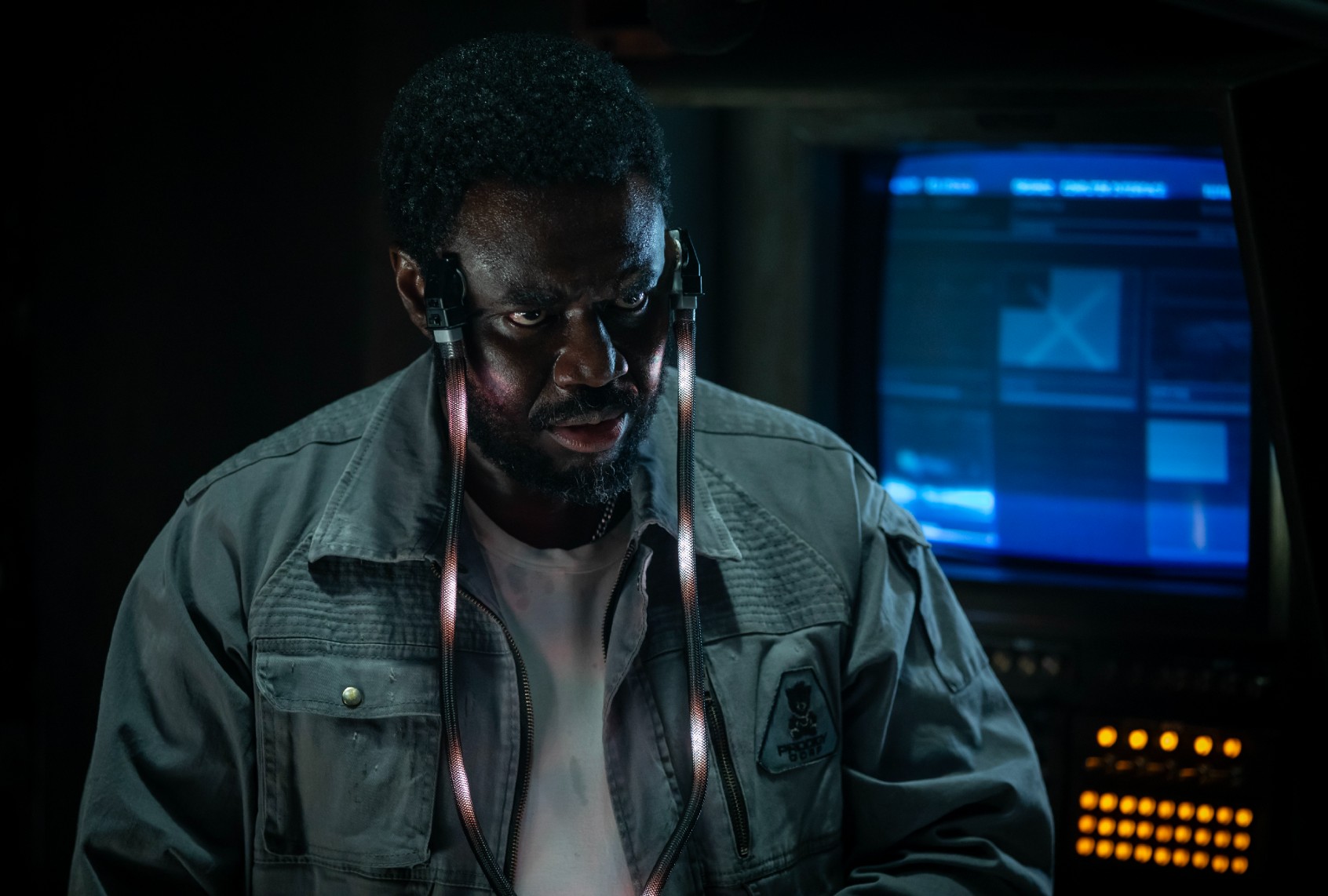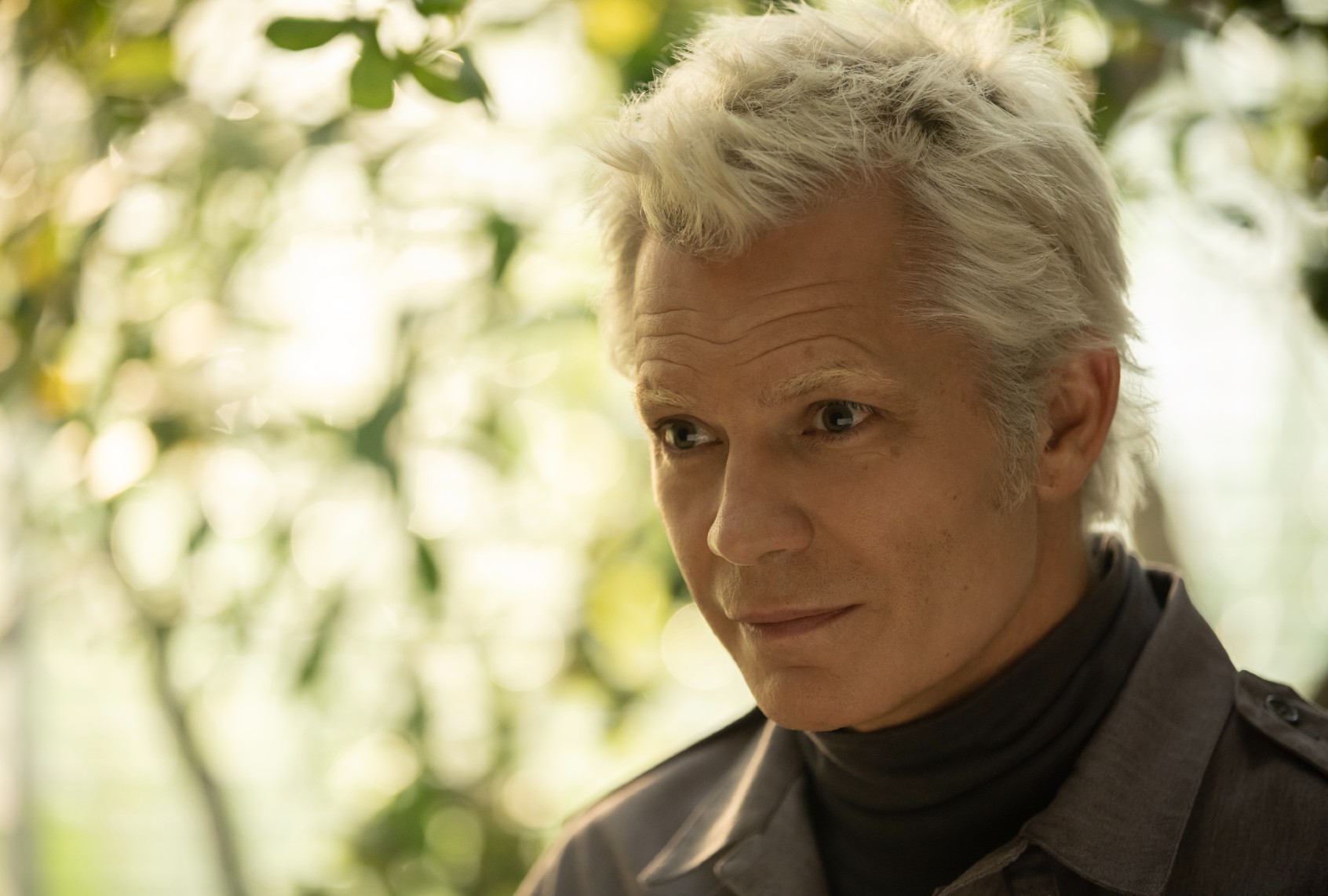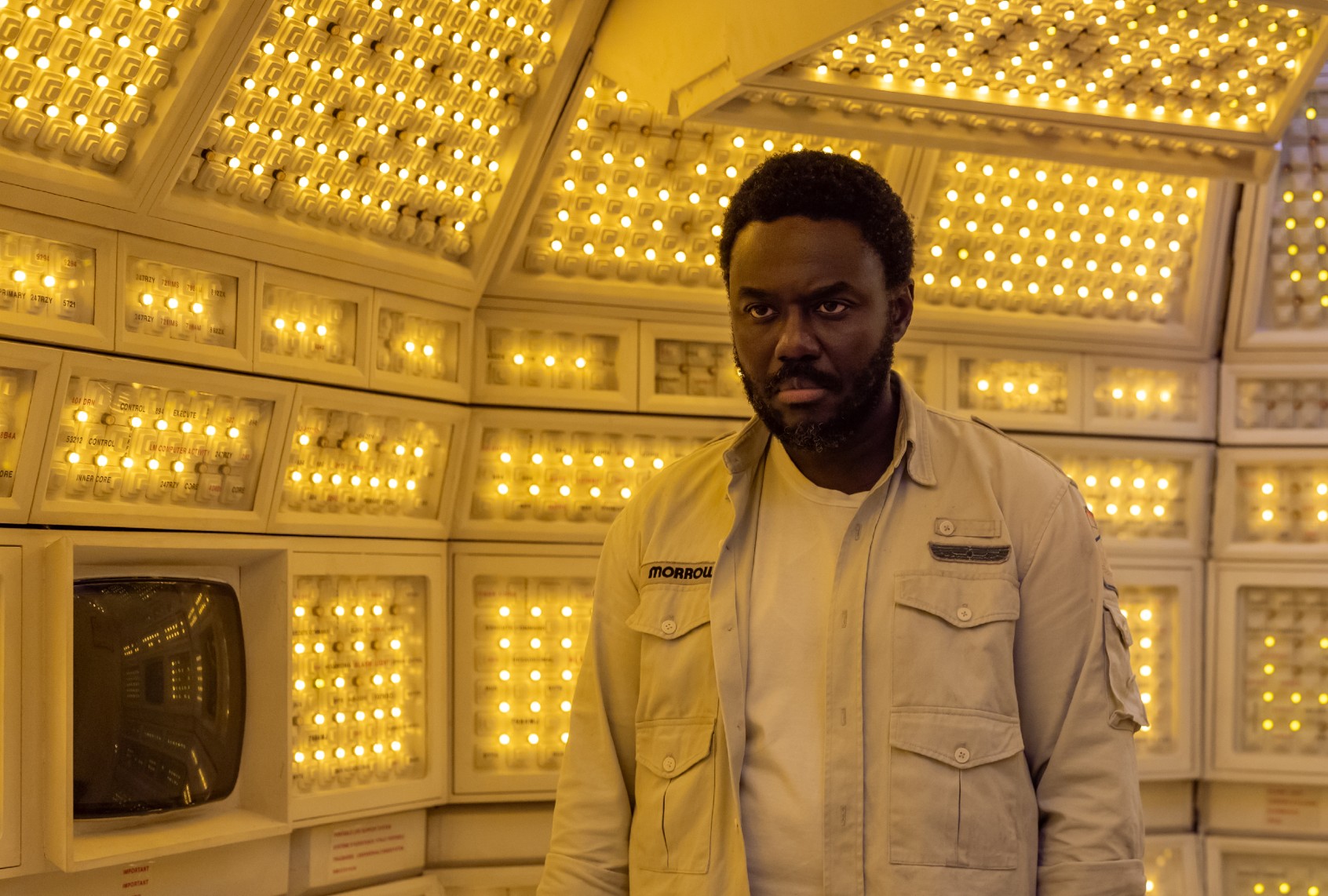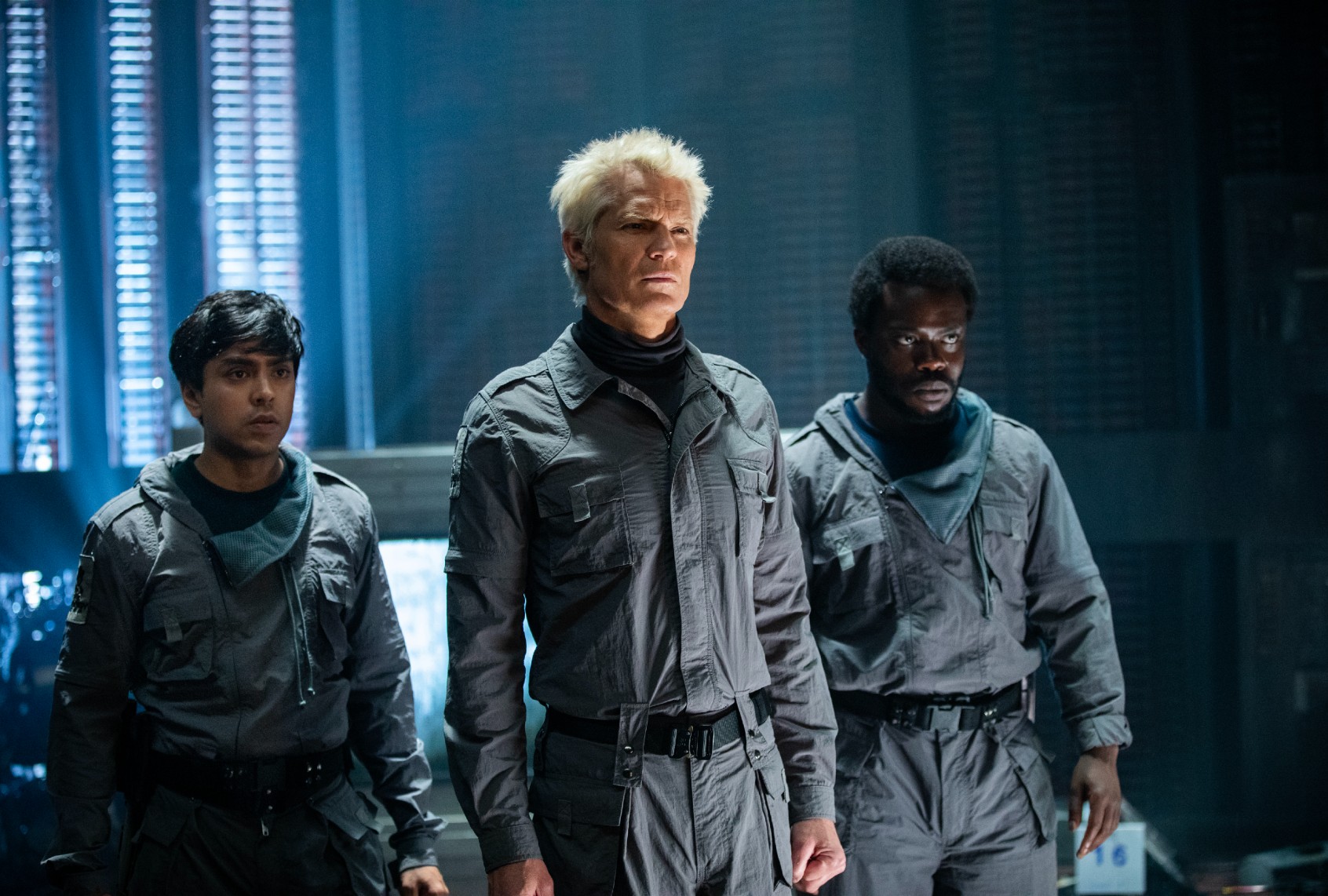When asked to recall the earliest movie that defined robots for him, “Alien: Earth” star Timothy Olyphant leapt from Ridley Scott’s universe into an entirely different sector of space. “I certainly remember ‘Star Wars’ as a kid. I certainly remember those droids being so vivid and lovable and memorable,” he shared in a recent video interview. “And boy, if my memory serves, those droids were there just to serve humanity; so docile, nothing frightening about them.”
“I don’t feel like that’s where we’re headed,” he added.
On that, Olyphant and his co-star Babou Ceesay agree. For Ceesay, the relationship between humans and robots was solidified in his mind by 1991’s “Terminator 2: Judgment Day.”
“When I watched that, I remember feeling actual dread at the idea that there’s, in the future, artificial intelligence that has become strong enough to send someone back in time to kill someone who’s fighting it in the future,” Ceesay said in a separate Zoom interview. “My first understanding of artificial intelligence is that it is a threat to human life.”
Along with being one of cinema’s most durable monster franchises, “Alien” constantly assesses what it means to be human, and whether our confidence in our supposedly superior intelligence is justified. Pitted against the relentless prey drive of its xenomorphs, all the brains in the galaxy are useless; the bugs find ways to survive, breed and come at us from new angles.

(FX) Babou Ceesay as Morrow in “Alien: Earth”
“My first understanding of artificial intelligence is that it is a threat to human life.”
If the space roaches don’t kill us, a malfunctioning, ticked-off droid might. Noah Hawley’s TV series expands that part of the conversation through Olyphant’s chilly synth, Kirsh, and Ceesay’s determined cyborg, Morrow. Each embodies facets of the ongoing debate about the role robots should play in society.
Next to ChatGPT’s incursion into daily life, which succeeded without our permission or, just as likely, our notice, a culture-wide robot invasion seems much farther down the road. But right now, bipedal ‘bots are getting a test run at an Amazon warehouse in Oregon, tromping around labs and a few tech headquarters. The same Washington Post story reporting those developments also takes readers inside a robot fight club in San Francisco.
So let’s not fool ourselves — a “Terminator” ending is much more plausible today than it was in the ’80s and ’90s. Given the extensive abuse to which we subject mechanical helpers that aren’t endowed with consciousness, why wouldn’t they turn on us if they were?
That question adds to the dramatic tension in Kirsh’s arc, since it’s not only self-aware but confident in its superiority to humankind. Some of the show’s most delicious moments feature Olyphant’s android responding to its bratty creator’s slight by simply staring at him with a tinge of menace before acknowledging his demand.
The events of “Alien: Earth” stem from a proprietary battle between Weyland-Yutani, the film franchise’s star corporation, and Prodigy, introduced in the show. Kirsh is a Prodigy scientist working beside Hybrids, a proprietary invention that involves downloading human consciousnesses into synthetic bodies.
Given the extensive abuse to which we subject mechanical helpers that aren’t endowed with consciousness, why wouldn’t they turn on us if they were?
Morrow was the chief security officer on the Maginot, the Weyland-Yutani deep space research vessel that crash-lands in Prodigy territory and carries several lethal extraterrestrial species. In their first confrontation, which occurs inside the wrecked ship and near a clutch of xenomorph eggs, Kirsh and the Hybrids have the upper hand. Morrow is only part machine, you see, and the android notices that the specimens react to him as Morrow insists that the alien species belong to Yutani. As the eggs threaten to open, the android smoothly warns the talking meat in front of him, “If you’re not careful, you’re going to belong to them.”

(FX) Timothy Olyphant as Kirsh in “Alien: Earth”
Speculative fiction has wondered what robots can do for us, or to us, since the dawn of the industrial age. Over the years, movies and TV have provided a range of images and scenarios determining what intelligent robots can look like. “Star Wars” is a space opera and a series of family movies made, in part, with toy licensing in mind. Friendly droids sell a lot more action figures than, say, frightening ones like Maximillian, the security robot turned murder machine in Disney’s 1979 sci-fi movie “The Black Hole.”
Sharing with Olyphant that this was my earliest memory of what robots might be capable of resurfaced an equivalent fright in his memory: The Robot from “Lost In Space.” Granted, the many years between his childhood and now haze the picture. “Was he ever particularly scary?” Olyphant asked. “My childhood memory of it was that it was a bit scary, certainly, as opposed to the ‘Star Wars’ droids.”
That depends on how a young kid might feel about a clunky appliance with flexible duct hose for arms, and whose main claim to fame is screaming, “Danger, Will Robinson!”
We need your help to stay independent
Synthetics in the “Alien” realm blend in with humans, although Kirsh’s shocking white hair and eyebrows immediately identify him as not like the others. Hawley and the actor jointly decided to assign this physical trait to Kirsh, a visual ode to Roy Batty, Rutger Hauer’s formidable Replicant from “Blade Runner,” another of Scott’s futuristic fables.
Roy’s heartbreaking flaw, shared with models like him, is the ability to artificially develop self-awareness. His human creator programmed this into them, giving Roy and the Replicants who join him in rebellion a reason to despise mankind. The cruelest thing someone can visit on a being born to be exploited is to give them the ability to feel.
It’s unclear whether that’s in Kirsh’s programming. He’s also a Prodigy innovation, although in the franchise’s long Weyland-Yutani corporation history, he has many predecessors. Ash, Ian Holm’s science officer in “Alien,” was the first, and inspired Olyphant’s performance. Subsequent synthetics display a range of temperaments, from Lance Henriksen’s Bishop, realistic enough to pass for human, to Michael Fassbender’s David 8, the earliest Weyland-Yutani invention to achieve a lifelike version of artificial intelligence. Like Roy Batty, he also came to despise his maker.
Ceesay likens Morrow’s plight to our current fears of A.I. replacing us.
Film and TV mechanical beings should warn us about everything that could go wrong when we try to program artificial intelligence to think and feel like us, only better, since our brains can’t move at the speed of a supercomputer. Not without implanted hardware, anyway.
Enter Ceesay’s Morrow, a cyborg with a mechanical arm and other technological augmentations, such as the ability to download a starship’s files into his brain. Organically speaking, Morrow is still human but enhanced. That does a number on his moral compass. He’s stronger than someone who isn’t augmented. That also means he doesn’t die as easily. Not like his loved ones.

(FX) Babou Ceesay as Morrow in “Alien: Earth”
“When is a machine not a machine?” Morrow poses this riddle to an unsuspecting Hybrid once he figures out their adult bodies are governed by the malleable, gullible minds of children. The cyborg has yet to reveal a specific answer. Maybe Morrow is living his way toward it. The Maginot’s fiery return to Earth happens 65 years after his mission originally launched. Since his family is gone, nothing tethers him to his human life. Therefore, the mission — or the program — is all he has.
Ceesay likens Morrow’s plight to our current fears of A.I. replacing us. Morrow, he said, “has to be as efficient and as synthetic as he possibly could be, and push away all the human weaknesses that he has, so that he remains useful. Ultimately, that’s the fear with A.I. Will it make us obsolete? How can you be useful? In the end, maybe man always wins.”
Kirsh wouldn’t bet on that, but the actor playing him hopes so. “I don’t lose a lot of sleep over it,” Olyphant told me, “but I mean, if I take a beat and give it some thought, I’m not sure about this whole direction we’re headed in. Like the show’s themes, this pursuit of it, it’s hard for me to wrap my head around what’s so appealing about it.”
Start your day with essential news from Salon.
Sign up for our free morning newsletter, Crash Course.
Ceesay seconds that. “My hope is that A.I. never becomes so sentient that it knows that we’re destroying the planet,” he said. “My hope is that even when it does, it’s got a benevolence to it, a desire to help us, you know, [to be] some sort of extension of us rather than something separate to us.”
Does that mean we could see a day when Morrow and Kirsh find common cause? Ceesay thinks it’s possible. He views his mechanized human and his co-star’s android as opposites with an equal vision.
“If they see into a future that they feel they need to create, especially with these creatures on Earth, I can see them standing side by side,” he concluded, adding with a grin, “Who’s going to be in charge, is the question.”
New episodes of “Alien: Earth” debut Tuesdays on FX and Hulu.
Read more
about androids and cyborgs


